Their young world crumbled. Now the children of 9/11 look back

The suburban town of Montclair, N.J., was one of the hardest hit by the attacks on the World Trade Center. (Video by Carolyn Cole / Los Angeles Times)
- Share via
Reporting from MONTCLAIR, N.J. — The children of 9/11 are growing up.
Fifteen years after that cataclysmic day in 2001, the infants of the time — or those still then in their mothers’ wombs — are high school age. Then-toddlers are nearing or even starting college. The tweens of 2001 are young adults, and their elder siblings are marking life’s milestones: marrying, notching career achievements. Having children of their own.
In the arc of childhood, time bends in strange ways. The Sept. 11 attacks are part of history now. But for young people who lost a parent that day, the pain is ever present.
The attacks killed nearly 3,000 people — aboard four hijacked airliners, at the World Trade Center and at the Pentagon. Those people left behind 3,051 children under the age of 18, by the count of survivors’ groups. That day marked these youngsters’ entry into a cohort of bereavement, an exclusive club that, as more than one of them observed, no one would ever, ever wish to join.
“You don’t want to be that kid, the one everyone knows about,” said Francesca Picerno, who had just turned 9 when the towers fell, and is now an aspiring musician. Her dad, Matthew Picerno, 44, worked as a municipal bond broker at Cantor Fitzgerald, on the 104th floor of the north tower. He left the family home in Holmdel, N.J., that morning, and never came back.
Enduring so private a grief in so overwhelmingly public a context left a mark on all of these children. It’s braided, they say, into successes and sorrows alike, sometimes in wrenching and unexpected ways. It looms large over every casual encounter with a new acquaintance. It’s a built-in identity some rejected — and still do — while others have come to accept and even embrace it.
“You don’t want to be defined by it,” said Picerno, now a self-possessed 24-year-old, whose professional first name is also her childhood nickname, Ces — what her father and all the family called her. “But it’s such a huge part of who you are.”
When the towers fell, the world’s eyes were on New York City. But the reverberations were also felt with the force of an earthquake in dozens of tranquil suburbs that lay within commuting distance of Manhattan’s financial district — communities like Montclair, N.J.
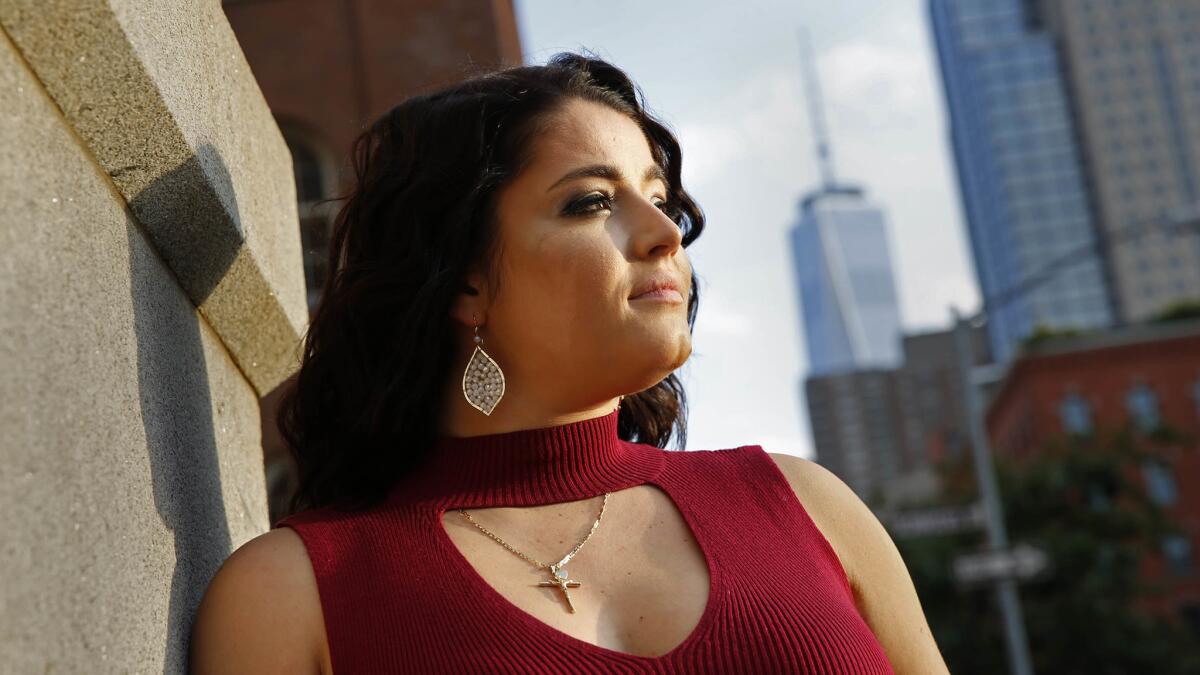
Railroad barons made the town, and its welter of train stations — six, in a community of only 38,000 — not only nourished the village-like neighborhoods that coalesced around these transport hubs, but made for a quick journey into the city, 12 miles away, across the river.
On 9/11, that proximity proved fateful. Almost everyone in Montclair — from its blue-collar enclaves to its hilltop mansions — knew someone working in New York that day: friends and neighbors, colleagues, wives and husbands, daughters and sons. Nine men from Montclair died. Seven of them were married, and most of those were fathers, some to very young children.
When Abigail Carter took a telephone call that morning from her husband, Caleb Arron Dack, she was busy at home with 6-year-old Olivia and 2-year-old Carter. With the baby fussing on her hip, she snatched up the phone, annoyed at the interruption.
Even now, 15 years later, she’s sometimes haunted by the memory of that little burst of impatience at what was to be their last conversation ever. But then, it had begun as such an ordinary day. There was no reason to think they wouldn’t be talking for all their lives.
“Now, I think the hardest thing is just not knowing what you’re missing,” Carter said. “And at the same time, knowing how much you’re missing.”
Montclair enfolded her in an embrace she will never forget, she said. Friends sat vigil; strangers offered greetings on her birthday. Bags of bagels and home-cooked meals appeared faithfully on her doorstep for months — “I had to buy a new freezer for all of them,” she said, mustering a laugh.
But for all the solace offered, Carter came to feel there was something suffocating about her new identity as a 9/11 widow. In so small a community, she knew that she — and especially her children — would be indelibly associated with immense tragedy, with even well-meaning kindness registering as a constant reminder.
In the end, she chose to make a new life for herself and them, in Seattle. The kids are 17 and 21, and doing well. Carter is in high school; Olivia is away at college, studying neuroscience and considering graduate school.
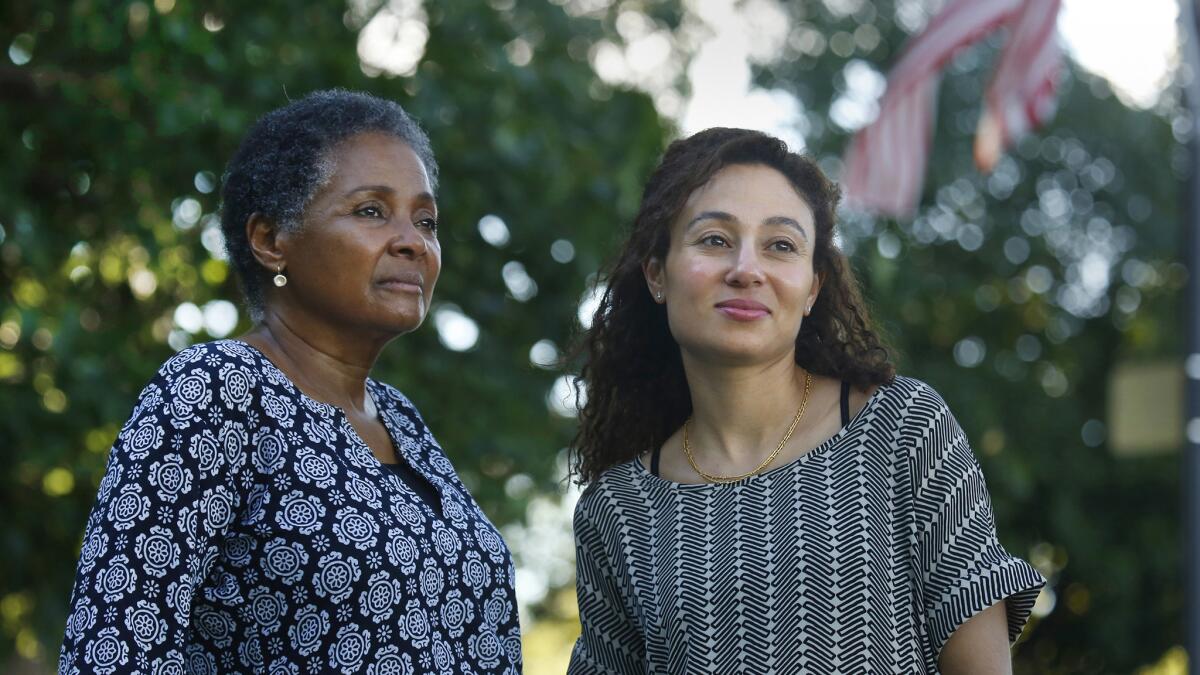
Lauren Kestenbaum, too, felt the need to leave Montclair not long after 9/11. She was 24 when her father, Howard, was killed, not a child, but not quite a full-fledged adult either — something she says she only recognized long afterward. She was on her way to work at the New York Public Library when the planes hit the towers; from a commuter bus, she saw the smoke rising.
Kestenbaum spent the remainder of her 20s in graduate school, first moving to the Midwest and getting a master’s degree in library science, then tackling the rigors of law school at Stanford University. Now she wonders if a grueling stint in academia was an attempt to deflect her loss.
“I was good at being in school, at focusing on goals, on ends,” she said. “I think it was a way of coping with what happened — a way of having some order, having some control.”
In what might be a means of making peace with the past, she is back in Montclair, working in nearby Newark as a children’s legal advocate. Her boyfriend is a friend from childhood who knew her father. Her mother, to whom she remains close, only recently sold the family home, and still lives nearby.
In familiar streets and parks and shops, she can summon happy memories.
Occasionally, on the 9/11 anniversary or as it approaches, Kestenbaum, now 40, will visit Holsten’s ice cream parlor in next-door Bloomfield, N.J. — best known now as the setting of the enigmatic final scene of “The Sopranos.” Long before that, it was a favorite of her father’s; they’d have a cheeseburger and a black-and-white milkshake, and talk and talk.
“When you lose a parent, at whatever point in life,” she said, “it makes you a child again.”
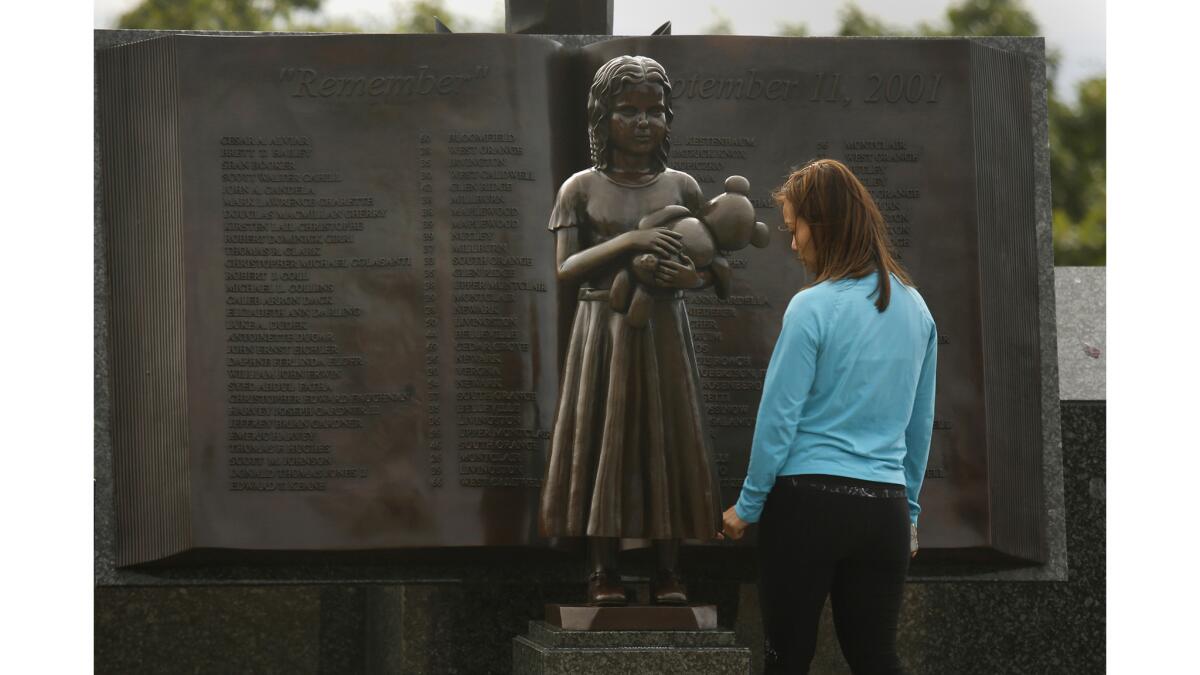
And then there are those 9/11 kids who have no recollections of a dead parent. Or what seems like none — though a few tiny, tantalizing shards may lie buried in memory.
Kahleb Fallon was only seven months old when his mother, Jamie Lynn Fallon, was killed at the Pentagon, where she was a logistics specialist. She had bright-red hair, and later, whenever the toddler saw that hue on anyone else’s head, he’d point and get excited.
Did he remember that about her? Could he? No one really knows.
Fallon was a 23-year-old single mother with no ties to her baby’s father. Her mother, Pat Fallon, cared for Kahleb as his guardian until he was nearly 5. By then, Jamie’s older brother Mike, who had married and started a family, felt ready to give his little nephew a home.
To become his father.
His wife Cornelia Lang, an associate professor of astronomy and physics at the University of Iowa, was the first to feel the tug, he said. They were still a new couple when 9/11 hit, and at Jamie’s funeral, she cradled Kahleb as the family grieved. Later, she told Mike the notion that had pierced her at the time: “We’re going to end up with this kid.”
Nation pauses to remember Sept. 11 »
Now Kahleb is 15 and thriving. He likes “regular-kid stuff,” his landscaper father says — sports, video games. Iowa City, with its reserved but warm Midwestern manner, may be the perfect place to raise a youngster who wants, for now, to keep at arm’s length a national and family tragedy that is part of him, yet somehow separate.
“He wants to be Joe Normal,” his father said. “You know what it’s like to be a teenager — they don’t like to be seen as different or weird.”
But Kahleb is also deeply interested in the wider world: foreign policy, military history, global affairs — coincidentally or not, all larger forces explicitly brought to bear in the events before and after the Sept. 11 attacks.
Kahleb, his father said, can sometimes be wary of close contact, perhaps a legacy of losing his mother when he was so tiny. What has softened him, though, is having not only a cousin-turned-sister but a little brother — Will, now 6 1/2, who idolizes him.
“When you have a little guy looking up to you like that, who sees you as a soccer god, who wants to be like you in all kinds of ways — you can’t withstand that kind of charm and love,” said Mike Fallon. “So you see a moment when Kahleb is showing him affection, strokes his face — as a parent, you find these little nuggets of joy.”
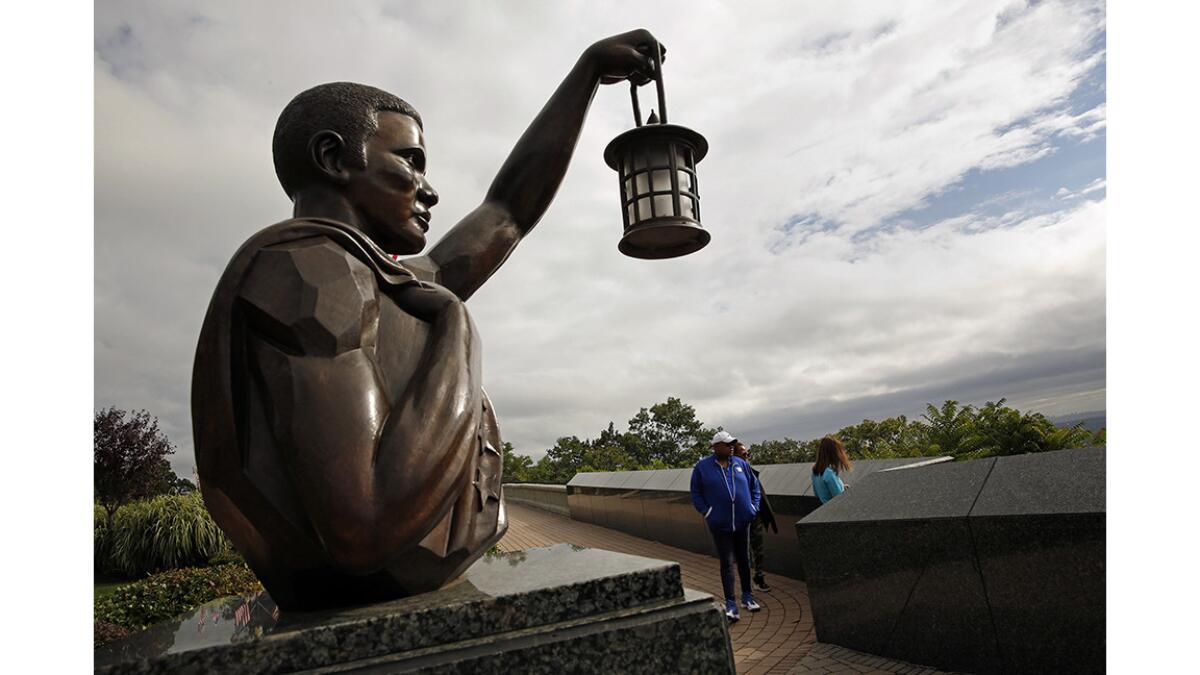
Remembrance is deeply personal, but also collective. Communities like Montclair, with still-vivid memories of individual and communal loss, are a magnified mirror of the national sentiment stirred up with each passing 9/11 anniversary.
You want to remember, local people say, but you also need to go forward.
Montclair’s small Fire Department is a repository of recollections of that day. Its firefighters view the 343 New York City counterparts who lost their lives as brethren. Many of them experienced the aftermath firsthand, heading across the river in endless shifts to work “the pile” — the smoking, dust-choked remnants of the fallen towers.
“There are things I saw there that I’m never going to talk about,” said fire official John Thomas, 55, running a hand through his close-cropped silver hair. His family, he says, scarcely saw him in the weeks after the attacks — something that, in retrospect, gave him pause. After all, they needed him too.
“But I’d do it again,” he said. “No matter how busted up we all are from it, with stuff inside our lungs that might kill us, I’d do it again.”
It’s always been a community that pulls together, said James Johnson, a lawyer who has deep family roots in Montclair. Although he moved away for long stretches, including a period when he worked as a senior Treasury Department official, he is back now — living in a hillside home in an affluent neighborhood where segregationist practices prevented his African American father, a real estate agent, from selling houses.
Over the years, he has watched the town rebound from the Sept. 11 attacks.
“There’s a sense of resilience here,” he said. “You see it 15 years out, and you could see it even at the time.”
Mark Porter, editor of Montclair’s struggling but prize-winning weekly newspaper, sees a continuing sense of solidarity as each anniversary approaches — even if he believes the long U.S. wars in Afghanistan and Iraq clouded the clarity of purpose that the town, and the country, felt in the wake of the attacks.
“It’s still a very fresh memory,” said Porter, whose wife was working at the World Trade Center that day. While waiting hours to learn her fate — she escaped alive — he and the paper’s staff ignored their own fears and set themselves to their task: telling the town’s story.
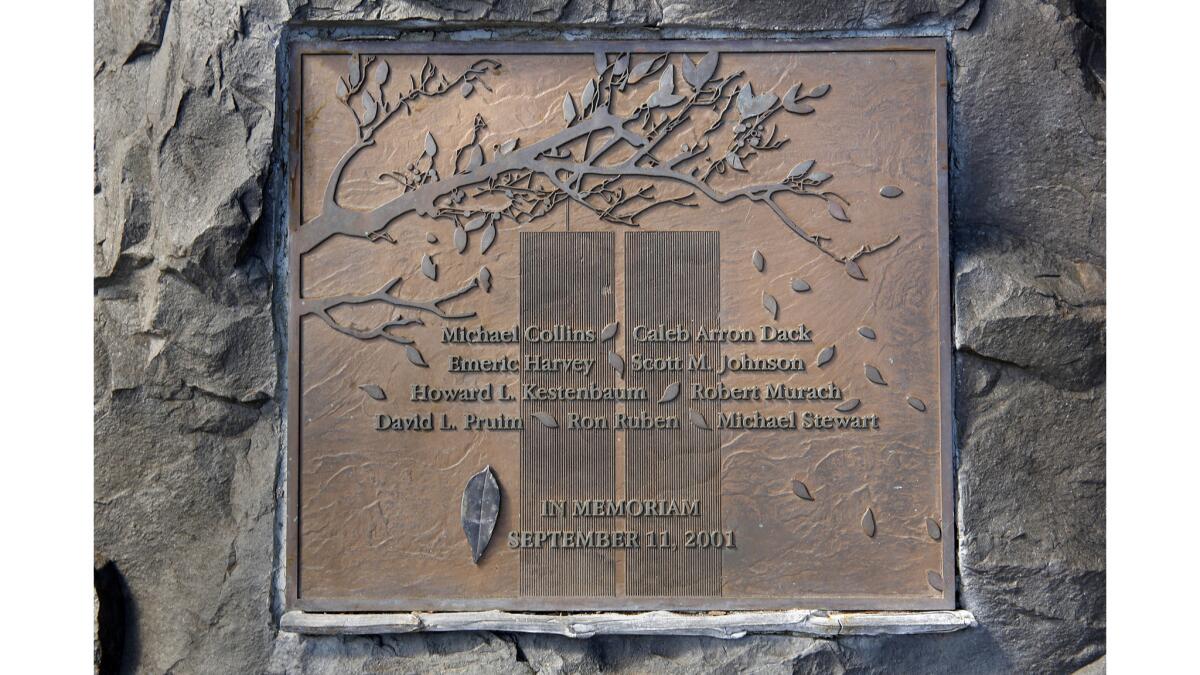
Montclair has its own small memorial to the fallen — nine names inscribed on a rock-embedded plaque in a small park opposite a busy bookstore-cafe whose outdoor seating is filled to overflowing on a sunny early-autumn day. There is also a larger monument to the county’s 9/11 dead at the scenic overlook in the Eagle Rock public park, with a sweeping view of the Manhattan skyline.
Lauren Kestenbaum likes to come to that overlook and think of her father — but not on the anniversary days. While many of the families take part in local commemorations, or the larger ceremony held at ground zero in Manhattan, she and others often prefer a quieter setting on that day.
Many of the 9/11 children prefer to mark other occasions in remembering a lost parent — birthdays or family events unrelated to tragedy. Ces Picerno, living at her family home and working three jobs while endeavoring to launch her musical career, says she is happy that her mother kept a trove of videos and photographs, even if for years she and her two brothers couldn’t bear the sight of them.
Now they can not only look without crying, but smile. Her dad thought he could sing, Francesca said, but — and here her mother, Petrina, joins in, and they chorus together, laughing — “he … couldn’t!”
Montclair’s mayor at the time of the attacks, Robert Russo, presides over a local ceremony every Sept. 11, even as the number of bereaved families remaining in town has dwindled. Firefighters ring the fire bell. A local poet, Jessica de Koninck, herself a widow, composed a poem of consolation dedicated to Lauren’s mother, Granvilette Kestenbaum.
“Always Tuesday,” it reads in part. “She floats like dust, like paper/encircling a crystal tower…”
---
In the aftermath of the Sept. 11 attacks, the children were at times their elders’ despair — and their salvation. Many parents, having lost a spouse or partner, said they doubted they could have gone on without the knowledge of how much their children needed them.
Janice Cohn, a psychotherapist who lives in Montclair and treated a number of widows from surrounding communities and served as consultant to the public schools, said many parents struggled, not only those who had lost a spouse.
“With lots of the children I worked with in school, it was ‘How do you make sense of a dangerous world? How do you explain violence and danger in a way that doesn’t make them frightened, or paranoid, or mistrustful?’” she said. “We want our kids to be empathetic, to care about others, but on the other hand, it’s a dangerous world — how do you strike a balance?”
Abigail Carter, who published a memoir of her young widowhood, remembers those early days as a blur — punctuated only by the urgency of helping her children deal with the loss.
“They were both so very aware of it,” she said. Her son, only 2, “kept pointing at every building and asking, ‘Is Daddy in there?’” Her daughter, 6 and having taken in more information, was worryingly silent.
Many children coped well initially with the loss of a parent, but succumbed later on to bouts of depression and even self-harm. Others struggled with friendships, feeling uneasy and gossiped-about, reluctant to divulge their family history as they moved to new towns or new schools, but unable to keep the word from leaking out.
For others, the usual adolescent acting-out — drug or alcohol use, bad judgment — was magnified by a sense of angry abandonment. Some coped badly when their mothers or fathers began dating or eventually remarried.
Ces Picerno was 18 when her mother, who had spent nearly a decade coping with everything from child-rearing to family finances to the loss of her own parents, began dating for the first time since Matthew Picerno’s death. She regrets that rather than being understanding, she was furious — “I was terrible,” she said ruefully.
The two are close now, but spar now and then — tattoos being a prime point of contention. Ces loves hers, especially those that are a tribute to her dad: inked circles on her wrists represent the cuff buttons of his dress shirts, and tattooed on her back is his favorite Frank Sinatra line, from “Summer Wind.”
“The world was new beneath a blue umbrella sky,” she recited, then closed her eyes and hummed a bit of the melody — remembering another bright morning.
Some who lost parents in the attacks see them, even in their absence, as a powerful influence in their lives. Lauren Kestenbaum toyed for a time with corporate law, a path she eventually realized was wrong for her, and says she is much happier now with her children’s advocacy work.
“My father always encouraged me to follow my heart, and at first, without him, that was hard to do,” she said.
Ces’ older brother Matthew, 27, is to be married next month — the first of the three siblings to wed. When she was little, she said, she had always pictured her father at her own wedding.
After his death, Ces thought she might one day have her two brothers walk her down the aisle. But lately, as she and her longtime boyfriend have talked more about marriage, she had another idea. She asked her mother if she would do it instead.
“She cried,” Ces said. “And said yes.”
Twitter: @LauraKingLAT
ALSO
Near ground zero, a memorial for 9/11 ... with Guinness on tap
Shanksville, Pa., will never forget 9/11, and locals are reminding others too
Editorial: Fifteen years after 9/11, we’re as trapped as ever by our anxieties and suspicions
More to Read
Sign up for Essential California
The most important California stories and recommendations in your inbox every morning.
You may occasionally receive promotional content from the Los Angeles Times.










